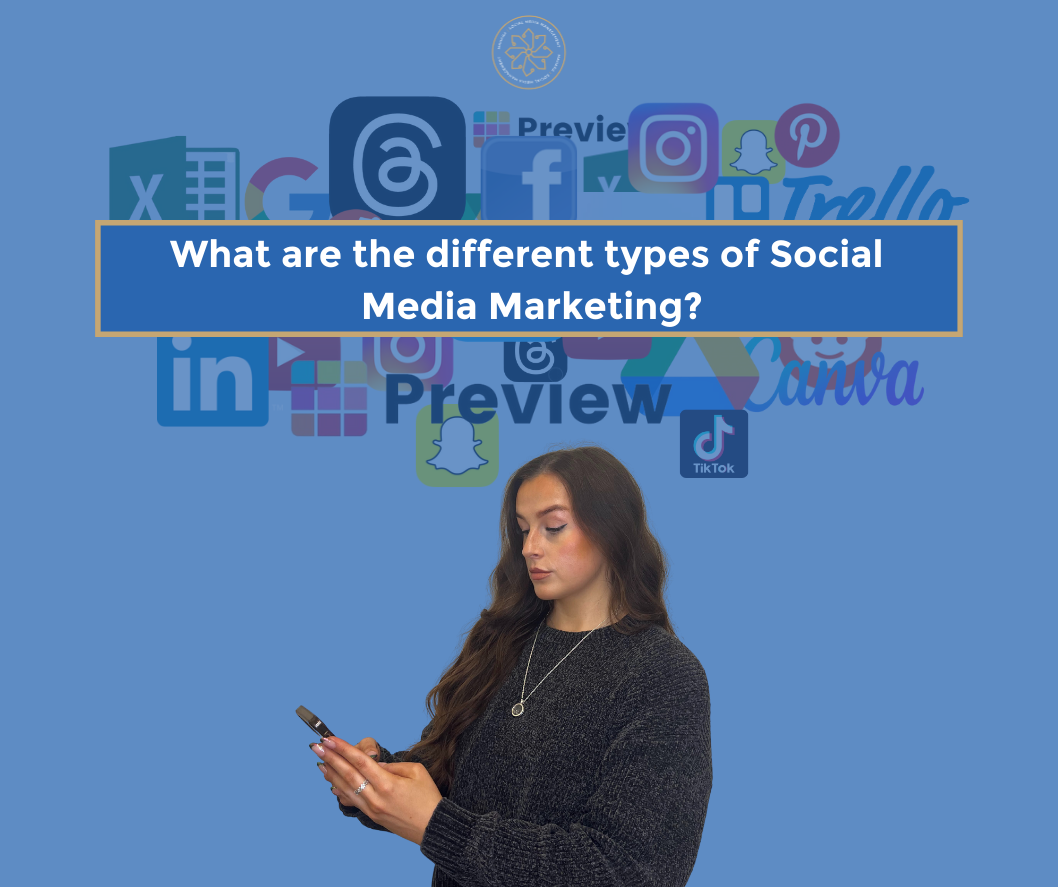
I’m sure you’ve heard from every Social Media Marketing agency that you need to harness the power of Social Media, but why do you need it and will it benefit your business? I’m going to remove the whole you need Social Media Marketing Sales pitch and explain what is it in a deep dive and let you choose what form of social media marketing can benefit your business.
In the fast-paced digital age, social media marketing has become an indispensable tool for businesses’ success to boost their online presence and engage with a broader audience. Social Media Marketing can range from content marketing to influencer collaborations to paid advertising. We’re going to explore the various types of social media marketing strategies that will help your business thrive in the digital era, without any sales jargon.
1. Content Marketing/Content Creation
Content marketing is the foundation of a successful social media strategy. It involves a strategic approach to content creation, aiming to attract and retain customers organically. The key is to produce content that resonates with your target audience and fulfils their needs. This can take many forms, including infographics, videos, emails, blog posts, podcasts, and more. Quality content can shape your brand’s image and help you achieve your business objectives. There is a lot of background work that goes into content marketing such as audience research, industry research and using a graphic designer and a copywriting expert, plus a clear content schedule and consistent brand voice and imagery across platforms will optimise your business through content marketing and is an organic way to reach a wider audience naturally.


2. Advertising and Sponsors
Traditional advertising still holds its place in the social media marketing world, and rightfully so. Businesses invest in audio and visual marketing to promote their products, services, or concepts in a less targeted way. This can occur through various channels, such as magazines, newspapers, TV, radio, websites, and social media platforms. Successful advertising strategies require careful consideration of target audiences, ad creation, testing, and retargeting of warm leads. One Ad campaign is not enough to convert an unknown user into a spending customer. Creating Ad campaigns will need different campaigns for each part of the sales funnel and targeting the right audience to guide them to the next step of the funnel. This will also require A/B testing to ensure you’re getting the best ROI from the money you invest into your advertising.
3. Influencer Marketing
Influencer marketing is one of the newest and best social media marketing techniques today. So, what is an ‘influencer’? A social media influencer is a person who has built a loyal audience through their social media platforms. This can be on ANY social platform and is not limited to the stereotypical platform of Facebook/Instagram or TikTok. Apart from creating content that appeals to their audience, they have built a loyal community and have the potential to convince their audience to buy the products they recommend. Collaborative opportunities with influencers include sharing coupon codes, social media product reviews, brand promotions, co-branded campaigns, and influencer-generated content.
The following are examples of influencer marketing:
– Sharing a coupon code so that the influencer’s audience can get a great deal.
– Social media product reviews.
– The brand’s promotions and new product launches are shared on their platform.
– Creating a co-branded product or campaign in collaboration with the influencer.
– Using influencers to create content for your brands, such as videos, blog posts, and social media adverts.


4. Social Media Management (Our bread and butter)
This is THE all-round approach to social media, this encompasses both organic and paid approaches. While results may not be immediate, this approach offers the biggest returns on investment and will transform your brand’s presence on social media. A fundamental part of social media management is that you need to interact with your community to gain a wider and more loyal audience and provide exceptional customer support. Building a loyal and sizable following can translate into significant revenue and recurring sales.
When a customer has an issue, complaint, or anything to say about a brand, where is the first place they go? Social media. It is important to build trust you must be engaged with your community and provide your customer’s support. This can be as simple as an in-depth FAQ section on your websites and socials, DM responses, content responses and reshares and rectifying any complaints or issues with your customers. This ensures they feel heard and trusted. Loyalty from your community can be found in giving back to your audience by running contests and giveaways can boost engagement and foster relationships.
5. Paid Media Marketing
Paid media marketing is a strategic effort used across various social media platforms. It involves paying the platform to promote your content or ads to a broader audience you have created. This can be a valuable component of your marketing strategy, boosting traffic, sales, and conversions, ultimately increasing revenue. Common types of paid media include paid social media posts, search engine ads, banner ads, and native ads, with pricing models like cost per click and cost per mile (per thousand impressions).


6. Building Your Brand Awareness/Following
Social media platforms are powerful tools for building brand awareness. Creating a unique content strategy, informed by community knowledge and effective management, can help your business stand out and drive revenue. It’s also an opportunity to display your brand’s personality, values, and voice, further establishing credibility and differentiating you from your competitors and the industry crowd. The modern approach to Social media is transparency in the business, formality makes it hard for a customer to connect and build trust with your brand if you don’t show a bit of brand va-va-voom.
7. Contributing to Forums
Each forum has a different demographic, so it’s good to look into the audience the forum targets before deciding which forum to focus your energy on if your community isn’t on the forum you may as well be talking to a wall. You need a forum that connects you with your ideal customers or readers. Think of forums as large online gathering spaces where industry-specific discussions are held. Sharing your expertise, answering questions, and building authority in your niche can redirect traffic to your website and provide invaluable market research for creating tailored content. There are thousands of topics that are being discussed on these forums 24/7, it doesn’t matter if you’re a first-time contributor or a seasoned expert– everyone has an opportunity to ask questions and share their answers.


8. Reviews
Customer reviews are a form of social proof, which can heavily influence potential buyers. User-generated content, which reviews are, are 8x more likely to create an impact than an influencer piece of content. However, an Influencer piece of content is 7x more likely to create an impact than branded content. 70% of consumers would find more trust and positivity in using your business with positive reviews.

In the world of social media marketing, these different marketing options can be reviewed and optimised to meet your business objectives. By selecting and combining the most suitable approaches for your brand, you can cultivate a strong online presence, engage with your target audience, and drive revenue. Stay ahead in the digital marketing world and consider how social media can help you achieve your business goals.
So, is Social Media marketing actually worth it for your business?
Email [email protected] for any questions about Social Media Marketing or support to get started, let’s accomplish great things.
